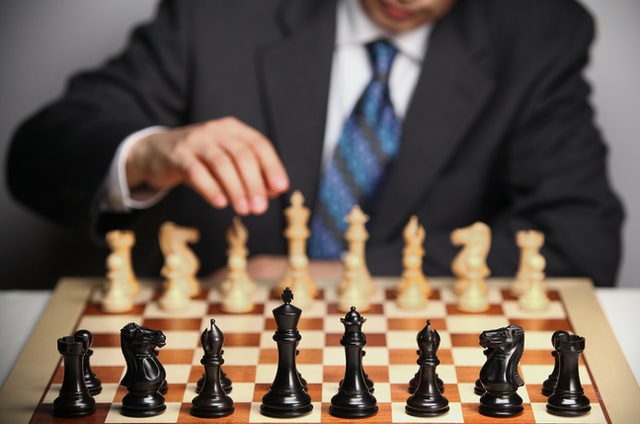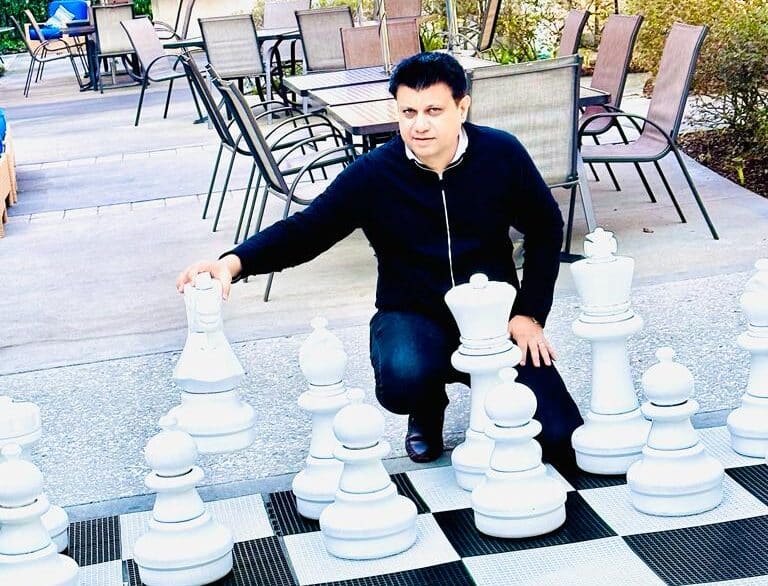In the game of chess, every move counts. It’s a game of strategy, foresight, and calculated risks. But did you know that chess can also be a powerful tool in the business world? In this fast-paced and competitive landscape, mastering the boardroom is essential for success. Just like in chess, making the right moves at the right time can elevate your business skills from being a mere pawn to becoming a strategic king.
This article will explore how the principles of chess can be applied to enhance your decision-making abilities, improve your problem-solving skills, and ultimately help you navigate the complexities of the corporate world with ways Cultivate Self-Confidence and finesse.
Whether you’re a seasoned executive or an aspiring entrepreneur, understanding the parallels between chess and business can give you a competitive edge that will set you apart from the rest. So, sharpen your mind, prepare your strategy, and let’s delve into the world of chess and its invaluable lessons for the boardroom.
Table of Contents
The correlation between chess and strategic thinking
- Chess is often referred to as the “game of kings,” and for good reason. It requires a high level of strategic thinking, just like the world of business.
- In chess, you must analyze the board, anticipate your opponent’s moves, and plan your own strategy accordingly.
- Similarly, in business, you need to assess the market, understand your competitors, and devise a winning plan.
- The correlation between chess and strategic thinking lies in the ability to think several moves ahead and make calculated decisions based on careful analysis.
- By honing your strategic thinking skills through chess, you can develop a knack for identifying patterns, spotting opportunities, and mitigating risks.
- This translates directly into the business world, where being able to think strategically can give you a significant advantage.
Whether it’s anticipating market trends, identifying new revenue streams, or navigating complex negotiations, the ability to think strategically is crucial for success in the boardroom. - Chess also teaches you the importance of adaptability and flexibility. Just like in business, the game can take unexpected turns, and you need to be able to adjust your strategy accordingly.
- By learning to adapt to different scenarios and think on your feet, you’ll be better equipped to handle the ever-changing landscape of the business world.
Developing critical thinking skills through chess
- Critical thinking is a fundamental skill in both chess and business.
- In chess, you must analyze the position on the board, evaluate the consequences of each move, and make informed decisions.
- Similarly, in business, critical thinking allows you to assess complex situations, evaluate potential outcomes, and make sound judgments.
- Chess helps develop critical thinking skills by challenging you to consider multiple factors simultaneously.
- You need to weigh the advantages and disadvantages of each move, anticipate your opponent’s responses, and evaluate the long-term consequences of your decisions.
- This kind of analytical thinking is invaluable in the business world, where you often face complex problems that require careful analysis and evaluation.
- Furthermore, chess teaches you to consider different perspectives and think outside the box. It encourages creative problem-solving and the ability to find innovative solutions to challenging situations.
- These critical thinking skills can be directly applied to the business world, where finding unique solutions and thinking creatively can give you a competitive edge.
Chess as a tool for improving decision-making abilities
- In both chess and business, decision-making is a critical skill.
- Every move you make in chess can have far-reaching consequences, just like every decision you make in business can impact your success.
- By playing chess, you can improve your decision-making abilities and learn to make more informed and strategic choices.
- Chess teaches you the importance of considering all available options before making a move.
- It encourages you to evaluate the risks and rewards of each decision and choose the best course of action.
- This kind of decision-making process can be directly applied to the business world, where making informed choices is essential.
- Additionally, chess helps develop your ability to make decisions under pressure. In a game where time is limited, you must think quickly and make decisive moves.
- This skill is highly valuable in the boardroom, where you often face high-pressure situations that require quick thinking and decisive action.
Enhancing problem-solving skills through chess
- Problem-solving is an integral part of both chess and business. In chess, you’re constantly faced with obstacles and challenges that require creative solutions.
- Similarly, in business, you encounter problems and obstacles that need to be overcome.
- Chess helps enhance problem-solving skills by training you to think critically and find innovative solutions.
- It teaches you to break down complex problems into smaller, more manageable parts and analyze them systematically.
- By developing these problem-solving skills through chess, you’ll be better equipped to tackle challenges in the business world.
- Furthermore, chess teaches you the importance of persistence and perseverance. In a game where setbacks are common, you must learn to bounce back from losses and find new strategies.
- This resilience is crucial in business, where you’ll inevitably encounter setbacks and obstacles along the way.
By developing resilience through chess, you’ll be better prepared to face challenges head-on and find solutions.
Building patience and resilience with chess
- Patience and resilience are both virtues that are essential in both chess and business. In chess, you must patiently analyze the board, consider your options, and wait for the right moment to strike.
- Similarly, in business, patience is key when making long-term strategic decisions and waiting for the right opportunities to arise.
- Chess also teaches you resilience by exposing you to failure and setbacks.
- Losing a game can be discouraging, but it’s an opportunity to learn and improve. By playing chess, you develop the ability to bounce back from defeats, learn from your mistakes, and come back stronger.
- This resilience is invaluable in the business world, where setbacks are inevitable, and the ability to persevere is vital.
Chess and the art of long-term planning
- Long-term planning is crucial in both chess and business. In chess, you need to plan several moves ahead and anticipate your opponent’s responses.
- Similarly, in business, long-term planning allows you to set goals, allocate resources, and anticipate market trends.
- Chess helps develop long-term planning skills by training you to think strategically and consider the consequences of your actions.
- It teaches you to set goals, break them down into smaller milestones, and create a roadmap for success.
- By applying these long-term planning skills to the business world, you can set yourself up for success and stay ahead of the competition.
- Furthermore, chess teaches you the importance of patience and delayed gratification.
- In a game where victory often comes after a series of strategic moves, you must learn to prioritize long-term gains over short-term wins.
- This mindset is crucial in business, where success often requires sacrificing short-term gains for long-term success.
Improving creativity and innovation through chess
- Creativity and innovation are highly valued in both chess and business. In chess, you must think outside the box and find creative solutions to complex problems.
- Similarly, in business, creativity and innovation can give you a competitive edge and help you stand out from the crowd.
- Chess helps improve creativity and innovation by encouraging you to explore different strategies and consider unconventional moves.
- It teaches you to think outside the box and consider alternative approaches to problem-solving.
- By honing your creativity through chess, you’ll be better equipped to think innovatively in the business world.
- Furthermore, chess exposes you to a wide range of tactics and strategies, which can inspire new ideas and approaches.
- By studying different chess games and learning from the masters, you can expand your knowledge and discover new ways of thinking.
- This exposure to diverse strategies and tactics can be directly applied to the business world, where innovation and creativity are highly valued.
Chess as a means of developing leadership qualities
- Leadership is a crucial skill in both chess and business.
- In chess, you’re responsible for making strategic decisions, guiding your pieces, and outmaneuvering your opponent.
Similarly, in business, leadership involves making tough decisions, inspiring your team, and driving your organization towards success. - Chess helps develop leadership qualities by teaching you the importance of vision, strategy, and communication.
- It encourages you to think strategically, set goals, and inspire your pieces to work together towards a common objective.
- By honing these leadership qualities through chess, you’ll be better equipped to lead in the boardroom.
- Additionally, chess teaches you the importance of emotional intelligence and self-awareness.
- In a game where emotions can run high, you must learn to manage your emotions and make rational decisions.
- This emotional intelligence is crucial in the business world, where being able to understand and manage your emotions can make you a more effective leader.
Applying chess principles to business scenarios
Now that we’ve explored the parallels between chess and business, let’s dive into how you can apply chess principles to real-world scenarios. Here are a few examples:
- Assessing the competition: In chess, you constantly assess your opponent’s moves and anticipate their strategy. Similarly, in business, it’s crucial to assess your competition and understand their strengths and weaknesses. By studying your competitors and anticipating their moves, you can gain a competitive advantage.
- Analyzing risk vs reward: In chess, you must evaluate the risks and rewards of each move. Similarly, in business, you need to assess the potential risks and rewards of different decisions. By weighing the pros and cons and considering the potential outcomes, you can make more informed and strategic choices.
- Thinking several moves ahead: In chess, you must think several moves ahead and anticipate your opponent’s responses. Similarly, in business, it’s important to think ahead and anticipate future trends and challenges. By considering the long-term consequences of your decisions, you can stay ahead of the game.
- Adapting to changing circumstances: In chess, the game can take unexpected turns, and you need to be able to adjust your strategy accordingly. Similarly, in business, you need to be adaptable and flexible in the face of changing circumstances. By being open to new ideas and willing to adjust your strategy, you can navigate the complexities of the business world.
These are just a few examples of how you can apply chess principles to business scenarios.
By studying the game of chess and understanding its principles, you can develop a strategic mindset that will set you apart from the rest.
Conclusion: Harnessing the power of chess for business success
- Chess is not just a game; it’s a powerful tool that can enhance your business skills.
- By mastering the boardroom, you can elevate your decision-making abilities, improve your problem-solving skills, and navigate the complexities of the corporate world finiding newer ways to cultivate self-confidence and finesse.
- Whether you’re a seasoned executive or an aspiring entrepreneur, understanding the parallels between chess and business can give you a competitive edge that will set you apart from the rest.
- So, sharpen your mind, prepare your strategy, and harness the power of chess for business success.
- By applying the principles of chess to the boardroom, you can become the strategic king of your industry. Just like in chess, every move counts.
- Make the right moves at the right time, and watch your business skills soar to new heights.






























